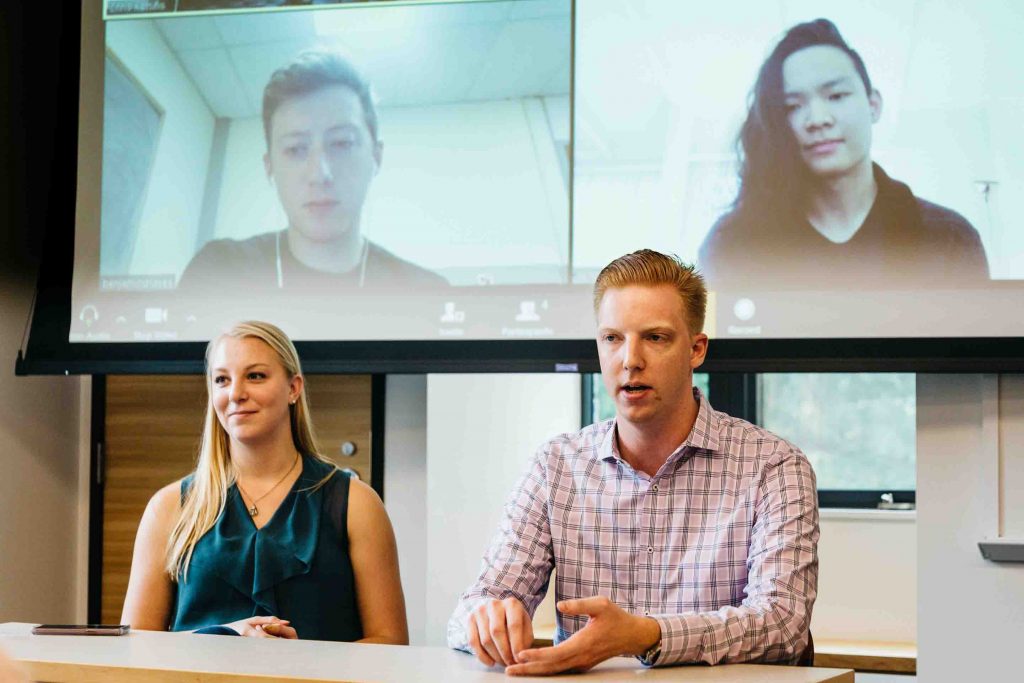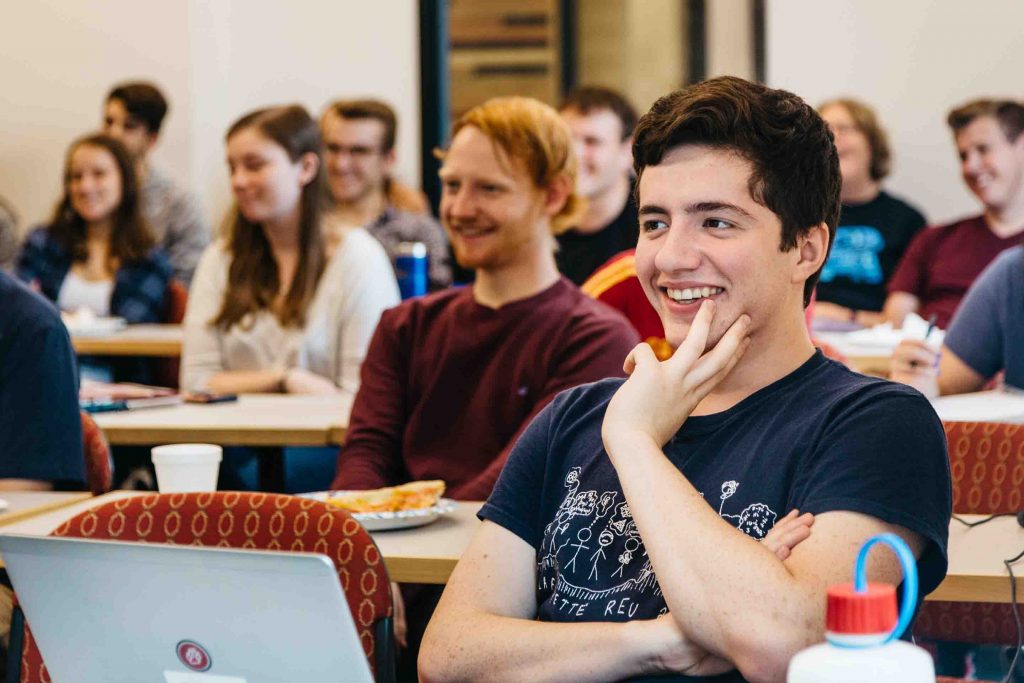By Katie Neitz
The mathematics department recently hosted a career panel, featuring four alumni who were in students’ shoes just a short time ago. The guest speakers represented a variety of career paths to illustrate the scope of opportunities available to students educated at Lafayette.
“I wanted to organize this event so our students could hear firsthand, from people who were in their position just a short time ago, about all of the different opportunities that are available to them when they study mathematics, statistics, and computing,” says Trent Gaugler, assistant professor of mathematics. “The panelists brought different experiences and perspectives, each emphasizing how different areas of the curriculum can be critical in the work that they do. I want our students to think broadly about how their education and experiences here at Lafayette prepare them for life after graduation.”
Here is advice from the four speakers.

Ben Draves ’17
Ph.D. candidate in statistics at Boston University
What I do: “I’m currently doing research in random network science and am fascinated by the subject. I hope to get a career in industry where I can continue to solve these types of problems.”
What worked for me: “Lafayette prepared me very well in different ways. The first is that my undergraduate math degree prepared me very well for my graduate classes. Second through liberal arts studies, I found that Lafayette helped me build my communication skills. This has proved very useful in teaching, consulting, and research settings in graduate school.”
What was valuable to me: “I had a research opportunity with Professor Trent Gaugler through EXCEL. I got to work one on one with him throughout the summer and into my senior thesis, which was one of the most rewarding experiences I had at Lafayette. Being introduced and immersed into statistical research was such a challenging and rewarding experience, and I wanted to continue that experience after Lafayette.”
What I’d recommend: “Feed your curiosity while at Lafayette. Take classes, attend talks, and talk to people who interest you and push you to think in different ways. The most value I have received out of my liberal arts degree has little to do with content but instead my ability to communicate with people across disciplines.”
Wah Loon Keng ’16
AI engineer, Machine Zone, Palo Alto, Calif.
What I do: “I build AIs using deep reinforcement learning (DRL) to play our games and optimize business operations.”
What worked for me: “The company found me through my open-source project SLM Lab, which is a framework for DRL. I really love it because it stands at the intersection between theory and engineering, and I think it gets many things right about human intelligence, which is the goal of AI.”
What was valuable to me: “At Lafayette, I took a lot of math and computer science courses, which helped. Most crucial were the independent study classes: I did one on neural networks with Professor Gaugler, and several AI and computation classes with Professor Liew and Professor Pfaffman from computer science. These classes were my first foray into the field I’m in today.”
What I’d recommend: “Have faith and persevere. I built many side projects that ended up nowhere, and the SLM Lab took two years before it took off and got me my current job. Also, along the whole journey, I met and received help from friends and strangers. So, don’t be afraid to ask, because people are often kinder than you think. Of course, remember to give back as well.”

Kaitlyn Lutz ’18
Transfer pricing associate, PricewaterhouseCoopers, New York City
What I do: “I work with my teams to analyze the different functions, risks, and assets of a company to help determine if its intercompany pricing agreements are in line with the transfer pricing regulations. I spend most of my time either writing transfer pricing reports or collaborating with my teams to come up with creative solutions for our clients’ needs. We also work on proposals for potential new clients as transfer pricing is becoming increasingly relevant due to recent tax reform.”
What worked for me: “I found the externship experience to be valuable because it allows you to observe what different career opportunities are actually like on a daily basis. By shadowing for a few days, you can get a feel for what the work culture would be like, what your daily projects will be like, and how you will be interacting with colleagues in a certain career. I did two externships: one in investment banking and one with a marketing firm. Both experiences helped me determine the work culture that I was looking for, even though I ultimately decided those careers as a whole weren’t right for me.”
What was valuable to me: “As a math major, I took several applied math courses, such as Operations Research, which provided a foundation for the technical skills I developed once starting my job. In addition, the theoretical math courses I took helped me develop complex problem-solving skills that I see myself using on a daily basis at work. The collaborative work environment in the math department also prepared me to work on a team and communicate my ideas clearly to my colleagues.”
What I’d recommend: “Network with as many people as possible. Networking can be more than going to career fairs or school-sponsored networking events. Just start a conversation with someone who has had experience in an industry that interests you, whether that someone is a relative, a professor, or a peer. Chances are that they will be able to share some valuable insight, or maybe they will be able to connect you with someone else that could. This is the best way to put yourself out there to explore different career opportunities and learn from people who have already had industry experience.”
TJ Lutz ’16
Investment performance analyst, Clarion Partners, New York City
What I do: “My team is responsible for calculating investment returns for the firm and each of our portfolios. Not only do we calculate how well our portfolios are performing, but we also prepare detailed analyses on what specifically is driving our performance compared to different benchmarks. We are also responsible for internal and external reporting of assets under management and other performance metrics.”
What worked for me: “When I started taking higher-level math and economics courses that allowed me to apply the skills and knowledge I developed throughout the course of my education, I was really enjoying the work I was doing. I realized I wanted to pursue a career that allowed me to continue to utilize these types of skills.”
What was valuable to me: “Networking was—and continues to be—extremely valuable. I was originally planning to go to medical school. When I decided to pursue a career in finance instead, I took advantage of multiple externships and spent countless hours networking not only to get a better idea of what specifically I wanted to do in the broad world of finance, but to build relationships that would prove to be valuable when applying for jobs.”
What I recommend: “Keep an open mind about your future and enjoy the ride. You don’t want to close yourself off to new and different ideas because it is impossible to know what kind of exciting opportunities are out there. Also, trying to figure out your next career move or applying for jobs or to graduate school can be stressful, so it is important to take a step back, relax, and enjoy the time you have at Lafayette because it flies by.”

